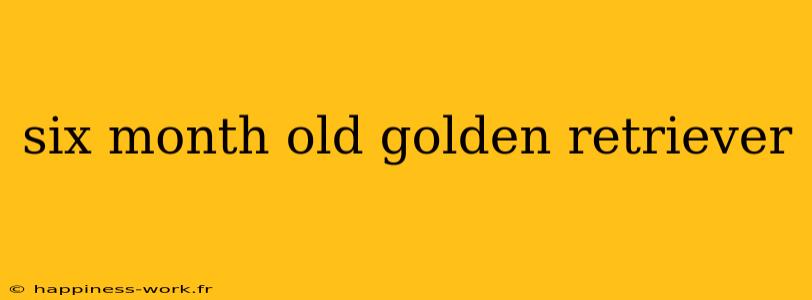A six-month-old Golden Retriever is at an exciting and crucial stage of development. This age represents a period of growth, curiosity, and learning. Proper care and attention during these formative months can lead to a well-behaved and healthy adult dog. Below, we will address some common questions about caring for your six-month-old Golden Retriever, provide additional insights, and share practical examples to make the journey smoother for you and your furry friend.
1. What should I be feeding my six-month-old Golden Retriever?
Answer:
At six months, your Golden Retriever should be eating high-quality puppy food specifically formulated for large breeds. This food should contain a balance of proteins, fats, vitamins, and minerals to support growth and development. Ideally, feed them three meals a day to maintain energy levels throughout the day.
Analysis:
Choosing the right food is crucial for your puppy's health. Look for foods with meat as the first ingredient and check for AAFCO (Association of American Feed Control Officials) certification to ensure nutritional adequacy.
Practical Example:
Consider brands like Royal Canin or Blue Buffalo, which offer specially formulated puppy food for Golden Retrievers. Always transition slowly between food types to avoid digestive issues—do this by mixing increasing amounts of the new food with the old over a week.
2. How much exercise does a six-month-old Golden Retriever need?
Answer:
A six-month-old Golden Retriever generally requires about an hour of exercise each day, including walks, playtime, and social interaction.
Analysis:
Regular exercise is vital for your puppy’s physical health and mental stimulation. It helps mitigate destructive behaviors born from excess energy and can prevent obesity, which is a concern for large breeds.
Practical Example:
Incorporate activities such as fetching a ball, agility training, or swimming (if your dog enjoys water). Daily walks should also be varied in route to keep your puppy interested and engaged.
3. What are some training tips for a six-month-old Golden Retriever?
Answer:
Training at this age should focus on consistency, positive reinforcement, and socialization. Basic commands such as sit, stay, and come are essential.
Analysis:
Golden Retrievers are intelligent and eager to please, making them relatively easy to train. Socialization is also crucial at this stage. Exposing your pup to various environments, people, and other animals can help build their confidence and reduce anxiety.
Practical Example:
Consider enrolling in a puppy obedience class. This not only helps with training but also provides socialization opportunities. Use treats, praise, and play as rewards, and ensure training sessions are short and fun to keep your puppy engaged.
4. Should I be concerned about my puppy’s chewing habits?
Answer:
Chewing is normal behavior for puppies, especially during teething. However, it’s essential to direct this behavior toward appropriate items, such as chew toys.
Analysis:
Chewing can help relieve the discomfort of teething, but it’s crucial to provide suitable alternatives to avoid damage to furniture and shoes.
Practical Example:
Invest in durable, breed-appropriate chew toys, such as rubber or nylon varieties. Rotate toys regularly to keep your puppy interested, and ensure that they are of a size and texture appropriate for a Golden Retriever.
5. How do I handle behavioral issues in my six-month-old Golden Retriever?
Answer:
Behavioral issues like barking, jumping, or nipping should be addressed with patience and consistent training.
Analysis:
Recognizing the root cause of these behaviors—whether boredom, anxiety, or lack of boundaries—can help address them effectively.
Practical Example:
If your puppy jumps on guests, train them to sit before receiving attention. Always use consistent commands and rewards, and consider distractions like toys or treats during training sessions.
Conclusion
Caring for a six-month-old Golden Retriever requires dedication, patience, and love. By providing proper nutrition, exercise, and training, you can guide your pup into becoming a well-mannered companion. Remember that this stage is also about bonding and understanding your dog’s unique personality. Enjoy this joyful and energetic time as your puppy grows and flourishes into adulthood.
This article was inspired by tips and insights found on WikiHow, which serves as a valuable resource for dog owners. For further information, please visit WikiHow.
